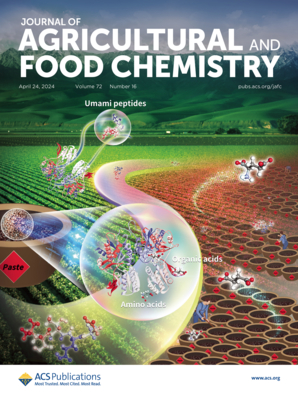Development and Mechanism Study of Vanillin-Based α-Amino Phosphonates against Potato Virus Y.
IF 6.2
1区 农林科学
Q1 AGRICULTURE, MULTIDISCIPLINARY
引用次数: 0
Abstract
Potato virus Y (PVY) is among the top ten plant viruses globally, posing a significant threat to crop yield and quality. Current chemical control agents are limited in variety and offer suboptimal efficiency. To address this, we designed and synthesized a series of new vanillin-based α-amino phosphonate derivatives and evaluated their anti-PVY activities and underlying mechanisms. Among the tested compounds, C2 demonstrated the highest protective activity (EC50 = 198 μg/mL), outperforming existing agents such as ningnanmycin (NNM, EC50 = 537 μg/mL), dufulin (EC50 = 495 μg/mL), and vanisufane (EC50 = 210 μg/mL). The α-amino phosphonate moiety in C2 contributed to its enhanced protective and inactivating activities. Molecular docking revealed that C2 forms a hydrogen bond with arginine 188 (ARG188) in the PVY coat protein (CP). In vivo experiments confirmed the important role of ARG188 in PVY intercellular movement. By competitively binding to ARG188 and activating the plant immune response, C2 significantly reduced PVY pathogenicity. These findings highlight the potential of vanillin-based α-amino phosphonates as effective anti-PVY agents. Specifically, compound C2 binds to PVY CP ARG188 and impairs PVY mobility, stimulates host immunity, and suppresses viral proliferation, offering a promising foundation for the development of next-generation antiviral agrochemicals.以香兰素为基础的α-氨基膦酸酯抗马铃薯Y病毒的研制及作用机理研究。
马铃薯Y病毒(PVY)是全球十大植物病毒之一,对作物产量和品质构成重大威胁。目前的化学防治剂种类有限,效率也不理想。为了解决这一问题,我们设计并合成了一系列新的基于香草素的α-氨基膦酸盐衍生物,并对其抗pvy活性和机制进行了研究。其中,C2的保护活性最高(EC50 = 198 μg/mL),优于现有的宁南霉素(NNM, EC50 = 537 μg/mL)、杜夫林(EC50 = 495 μg/mL)和万尼素(EC50 = 210 μg/mL)。C2中的α-氨基膦酸酯部分有助于增强其保护和失活活性。分子对接发现,C2与PVY外壳蛋白(CP)中的精氨酸188 (ARG188)形成氢键。体内实验证实了ARG188在PVY细胞间运动中的重要作用。通过与ARG188竞争性结合并激活植物免疫应答,C2显著降低了PVY的致病性。这些发现突出了以香草素为基础的α-氨基膦酸盐作为有效抗pvy药物的潜力。具体来说,化合物C2与PVY CP ARG188结合,降低PVY的移动性,刺激宿主免疫,抑制病毒增殖,为开发下一代抗病毒农用化学品提供了良好的基础。
本文章由计算机程序翻译,如有差异,请以英文原文为准。
求助全文
约1分钟内获得全文
求助全文
来源期刊
CiteScore
9.90
自引率
8.20%
发文量
1375
审稿时长
2.3 months
期刊介绍:
The Journal of Agricultural and Food Chemistry publishes high-quality, cutting edge original research representing complete studies and research advances dealing with the chemistry and biochemistry of agriculture and food. The Journal also encourages papers with chemistry and/or biochemistry as a major component combined with biological/sensory/nutritional/toxicological evaluation related to agriculture and/or food.

 求助内容:
求助内容: 应助结果提醒方式:
应助结果提醒方式:


